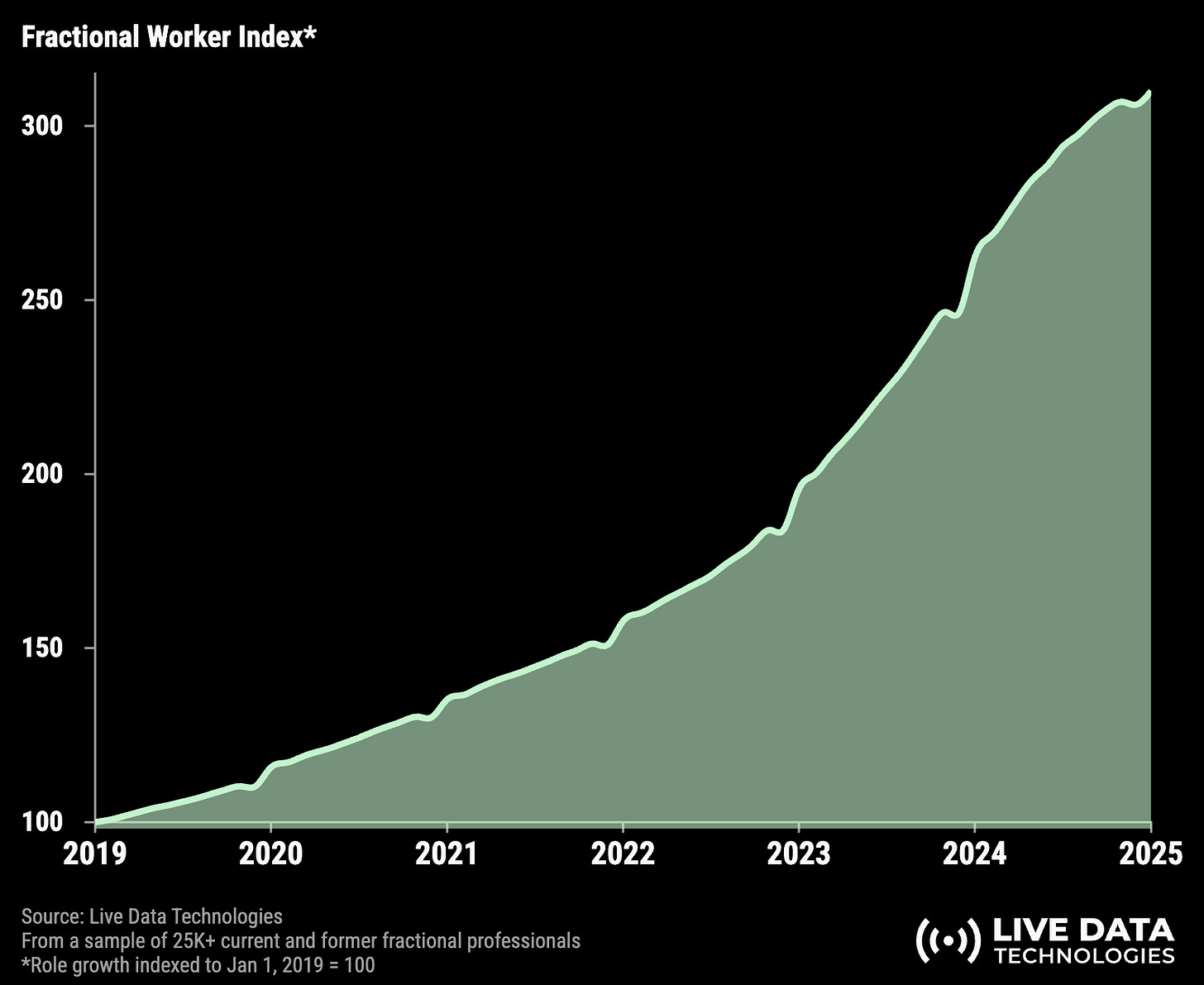Should your next job be a fractional one?
We interviewed Karina Mikhli, the founder of Fractionals United (~ a 14,000-member community). Fractional employment is growing fast. If you’ve been considering it, this post is for you!
Fractional employment changed my life. Very few career moves have had such a positive impact on my long-term goals, my time and my finances.
But I’ve heard many misconceptions. Aren’t you just a consultant? Isn’t it simply part-time work? I’ve also heard many questions from those considering the move: where to start, how to source work, etc. As you’ll see below, this trend isn’t going away anytime soon. My bet? It will accelerate even further in the next few years.

I was lucky enough to talk to Karina, the founder of Fractionals United. She launched her community at the beginning of 2023, making her better placed than most to discuss fractional work.
“
I became a fractional COO accidentally, before it was a thing really. I’d spent two decades in the publishing industry and was tired of reorgs and layoffs, so I started freelancing and fell into a pattern of running small businesses part-time (ie fractional COO work). Years later, after having briefly gone full-time with one of my clients, I came back to a different fractional landscape and couldn’t find a community for us to connect, collaborate, and learn from each other—so I decided to build it myself.
We discuss:
How Karina defines fractional workers (hint: they’re not consultants)
The pros and cons of fractional work and when to do it
How to get started with fractional work
How Karina defines fractional workers
A common question from sceptics is: Are you not simply a consultant? I’ve avoided this label for several reasons. Startups (my target market) usually see consultants as expensive line items that often deliver little aside from fancy slides. I prefer the term “operator” (even if slightly cringe). I’ve been there. I’ve done that. I can get clients there faster by doing rather than telling. This is what gets you hired at a startup.
“
Consultants are external and project-based, even if it’s a long-term project. Fractional workers are part-time embedded leaders. We are part of the team, with people reporting to us, and are long-term (ie, we don’t deliver and move on). The only difference between us and full-timer leaders is that we are part-time.
This is why I love interviewing people for this newsletter. That’s a better framing than I’ve ever been able to come up with. Most of my engagements have been long-term, even if I didn’t initially expect them to be.
“
I don’t do proposals; that’s for consultants. I do two-way job interviews. I want a job description and understanding of my responsibility, domain, and team. I also want to be sure that I can work with the CEO and that they’ll allow me to do the job he or she is hiring me to do.
Ironically, most fractional workers I’ve encountered who haven’t succeeded have taken the opposite approach—the hard sell. Overpromising a short-term outcome is a terrible way to start a working relationship (especially when it’s not delivered).
The pros and cons of fractional work and when to do it
“
After the pandemic, many people didn’t want to return to their previous ways of working. They want control over their time, which fractional work can provide. However, there are downsides: figuring out how to maintain a pipeline, paying your own taxes, and managing multiple contexts and clients simultaneously. It’s not easy.
I discovered this the hard way: I do not multitask as well as I thought I could. Managing multiple Slack workspaces, emails, and stakeholders? It quickly got to a point where I realised less is more. I now work with a maximum of 2 clients at a time.
We then move on to when someone should consider fractional work.
“
A fractional worker is a senior leader. We can work fractionally and still deliver value because we’ve done this job full-time and have the experience and skills. We know how to make the most of our resources, both time and team, and what mistakes to avoid. This takes time.
This experience is what allows fractional workers to save their clients time. Thinking back to how you can save your clients time is ideal framing for those considering the move to fractional work.
How to get started with fractional work
As with any product you’re selling, you need to define some basics before getting started. Figure out your edge, your buyer and where they’d usually buy.
In my case:
Edge: I’ve led growth teams at marketplaces and helped several marketplaces with international expansion.
Buyer: Early-stage marketplace founders find my services most valuable when they’ve found product-market fit and want to scale (geographically or otherwise).
Where they buy: They usually seek help from experts focused on growth & marketplaces through accelerators and/or niche marketplace communities.
Looking at my service as a product, the first two define my product market fit, whilst the third is my distribution. As with a product, distribution is the biggest priority.
“
Networking and business development is critical, but so is knowing your target and niching down. The best way to get started is by alerting your immediate network and joining communities like Fractionals United. Both will allow you to make connections with fractionals adjacent to what you do, for your target, and refer work to each other.
I strongly believe in the power of community. I’m closely involved with two, Everything Marketplaces (as a community EIR) and SYSTM (as a growth coach). These are often great places to be “discovered” outside my own distribution. Not only that, but I’ve also met some extremely smart people who I’m lucky enough to call friends. As you’ll discover, having great people around you matters a lot in fractional work.
Wrap up
In summary, fractional employment can be great when it works. But it’s not easy. For those considering a move, I always recommend having comfortable reserves to get through the initial months before those first clients land.
But when it does work, it can be some of the most freeing work ever. If you’re considering the move: surround yourself with others that have been through the journey, join relevant communities and don’t be afraid to put yourself out there. And if I can ever help, please don’t hesitate to leave a comment below or reach out 👋


